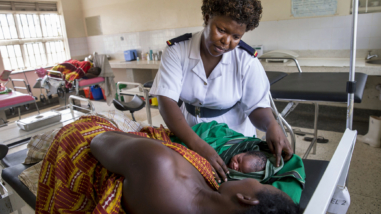Center for Global Development
For The Increasing And Improving Investments In The African Care Economy Project
-
Amount$500,000
-
Program
-
Date Awarded8/16/2024
-
Term24 Months
-
Type of SupportProject
Strategies
Overview
The Center for Global Development is an independent, nonpartisan, and nonprofit research institution that works to reduce global poverty and improve lives through innovative economic research that drives better policy and practice by the world’s top decision makers. The center’s research and policy engagement are structured around global health policy; sustainable development finance; migration, displacement, and humanitarian policy; education; and governments and development. This grant will develop an evidence-based case for investments in gender-responsive social protection and the care economy and provide insights into how country governments, international financial institutions, and bilateral donors can support gender inclusive macro-level economic policies. (Strategy: International Women’s Economic Empowerment).
About the Grantee
Grantee Website
www.cgdev.org
Grants to this Grantee
for the increasing and improving investments in the African care economy project
The Center for Global Development is an independent, nonpartisan, and nonprofit research institution that works to reduce global poverty and improve lives through innovative economic research that drives better policy and practice by the world’s top decision makers. The center’s research and policy engagement are structured around global health policy; sustainable development finance; migration, displacement, and humanitarian policy; education; and governments and development. This grant will develop an evidence-based case for investments in gender-responsive social protection and the care economy and provide insights into how country governments, international financial institutions, and bilateral donors can support gender inclusive macro-level economic policies. (Strategy: International Women’s Economic Empowerment).
for general operating support
The Center for Global Development (CGD) is an independent, nonpartisan think tank that works to reduce global poverty and improve lives through economic research that drives better policy and practice by the world’s top decision makers. The center’s research and policy engagement are structured around eight areas: global health policy, sustainable development finance, U.S. development policy, European development policy, U.K. development policy, migration and displacement, education, and gender equality and inclusion. The center also has cross-thematic work including a nonresident research fellows program; a diversity, equity, and inclusion initiative; and extensive media and communications outreach activities. As a result, this grant serves many goals across GEG’s entire portfolio (not just Evidence-Informed Policymaking (EIP)), as the grantee both generates high-quality evidence and has outsized influence in policy in areas related to (among other GEG interest areas) women’s economic empowerment, women's health, and broader development reform. Because of this, CGD often serves as a reference point for evidence used by professionals globally, both in terms of content and tactics.
for the New Evidence Tools for Policy Impact project
This grant will support a 12-month follow-on project that aims to advance key recommendations of the Center for Global Development (CGD) Working Group on New Evidence Tools for Policy Impact. The final report of CGD’s working group, launched in July 2022, envisions a renewed funding agenda for investments in impact evaluation (and the wider evidence ecosystem) as a means to enhance their value for public policymaking and to broaden bases of support and momentum for the evidence agenda. During this follow-on phase, CGD will focus on three interlinked areas of work: (a) advancing a new partnership between USAID and interested philanthropies to support locally based researchers in select countries to generate more policy-relevant research and evaluations; (b) informing the future agenda of USAID’s Office of the Chief Economist and Bureau for Policy, Planning and Learning to further drive the localization of evidence and learning in routine agency processes; and (c) continuing cross-cutting outreach and dissemination to amplify the working group’s overall findings and policy recommendations. (Strategy: Evidence-Informed Policymaking)


